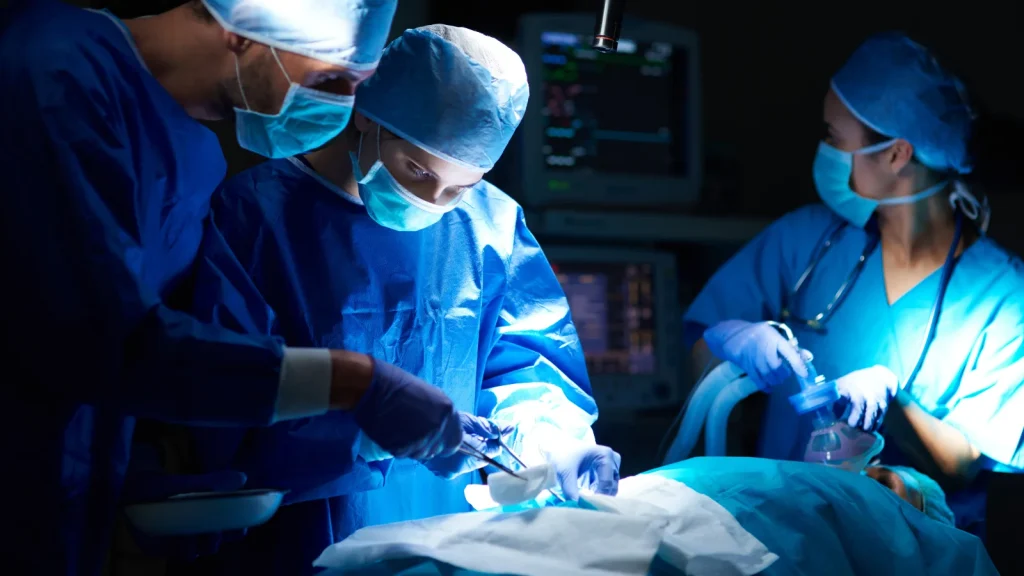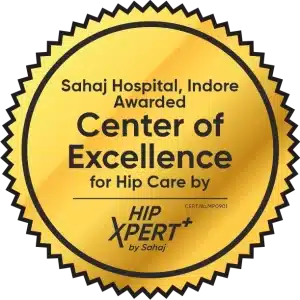URS – LASER
Kidney stones can cause significant discomfort and health concerns if left untreated. At Sahaj Hospital, Indore, we offer advanced URS – LASER treatment, a cutting-edge solution for kidney stones that ensures precision, safety, and effective results. With our team of highly skilled urologists and state-of-the-art technology, we are dedicated to providing comprehensive care tailored to each patient’s needs.
Our Specialties

Understanding Kidney Stones
Kidney stones are solid deposits of waste that accumulate in the kidneys when fluid intake is insufficient or waste compounds are high. These stones may vary in size, with smaller ones often passing naturally without symptoms. However, larger stones can obstruct the urinary tract, leading to symptoms such as:
- Intense pain during urination.
- Blood in the urine.
- Severe pain in the back or lower abdomen.
- Nausea and vomiting.
Diagnosis and Treatment Approach
At Sahaj Hospital, we prioritize accurate diagnosis to determine the size, location, and composition of kidney stones. Diagnostic tests include:
- Urine and blood tests to detect abnormalities.
- X-ray KUB (Kidney, Ureter, and Bladder) imaging.
- CT scans, if necessary, for detailed visualization.
For smaller stones, conservative treatments such as increased fluid intake and analgesics may suffice. For larger, obstructive stones, advanced procedures like URS – LASER are recommended.
What is URS – LASER?
Ureteroscopy (URS) is a minimally invasive procedure performed using a ureteroscope—a thin, flexible tube with a small camera. The ureteroscope provides clear visuals of the urinary tract, allowing precise treatment. For larger stones or obstructions, laser technology is employed to fragment the stones into smaller, passable pieces.
Why Choose URS – LASER?
- Versatility: Effective for small to medium-sized stones.
- Minimal Invasiveness: No incisions are required.
- High Precision: The ureteroscope provides clear imaging for accurate treatment.
- Quick Recovery: Most procedures are outpatient, with minimal downtime.
- Comprehensive Care: Stones not visible on X-rays can also be treated effectively.
The URS – LASER Procedure
The procedure, performed under general anesthesia, typically lasts about three hours. Depending on the size and location of the stones:
- Smaller stones are removed intact using a special retrieval bag.
- Larger stones are fragmented using laser technology.
If abnormalities like strictures (narrowing of the ureter) or growths are observed, appropriate interventions such as biopsies are performed.
Post-Procedure Care
After the procedure, patients are monitored for a few hours to ensure recovery from anesthesia. Common post-procedure instructions include:
- Drinking at least 500 ml of water to aid in flushing out fragmented stones.
- Using prescribed antibiotics and analgesics to prevent infection and manage pain.
- Watching for symptoms such as severe pain or fever, which require immediate medical attention.
When is URS – LASER Recommended?
URS – LASER is particularly effective for:
- Patients with small to medium-sized stones causing discomfort or obstruction.
- Cases where other treatments, like shock wave lithotripsy or percutaneous nephrolithotomy, have not been successful.
- Individuals who need anticoagulant therapy for other conditions.
However, URS may not be feasible for patients with very large stones or those with altered urinary tract anatomy due to previous surgeries.
Advantages of URS – LASER at Sahaj Hospital
Our advanced technology and expertise ensure:
- Accessibility to all areas of the kidney and ureter.
- Thorough treatment with minimal complications.
- Holistic care, including stone composition analysis for prevention of future occurrences.
What to Expect Before and After the Procedure
Preparation for URS – LASER is straightforward. Patients are advised on dietary restrictions, fluid intake, and any necessary adjustments to ongoing medications, especially anticoagulants.
Post-procedure, follow-up consultations are critical. The removed stone is analyzed to identify its composition, and preventive measures are recommended to avoid recurrence. For advanced and patient-focused kidney stone treatment, trust Sahaj Hospital. We are committed to providing the highest quality of care and helping you return to a pain-free life. Contact us today for expert consultation and treatment tailored to your needs.

